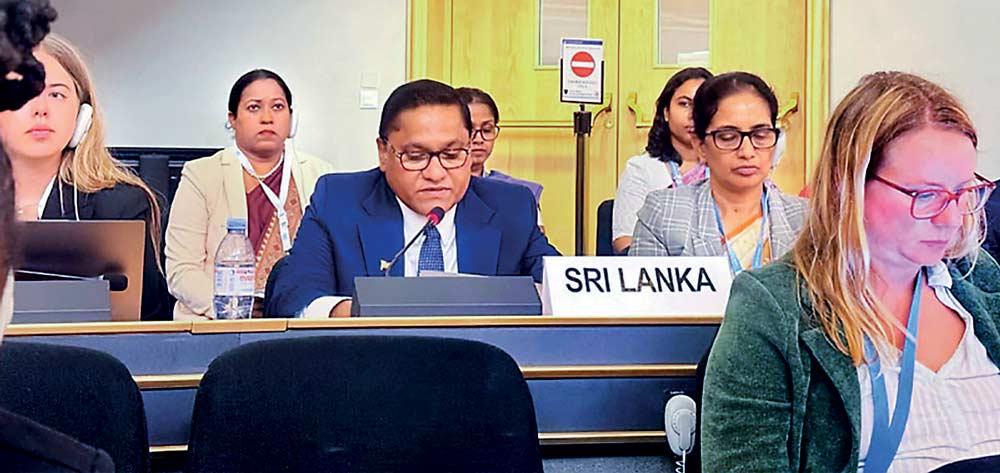The government was right not to spend goodwill and energy on the UNHRC resolution
Posted on October 14th, 2025
Courtesy The Daily Mirror

Foreign Minister Vijitha Herath argues that Sri Lanka cannot secure a favourable position in the vote because the UNHRC, due to its structure, since some blocs, such as Europe, tend to adopt a collective position. File Photo
The Foreign Minister attributes the ‘Geneva issue’ to the Rajapaksa administration’s politicisation of war victory for dynastic politics, preventing a credible national mechanism for addressing post-war grievances
Concerns have been raised over the two-year extension of the evidence-gathering mechanism, which could potentially enable universal jurisdiction cases against the Sri Lankan military personnel
 Another session of the United Nations Human Rights Council, which concerned Sri Lanka, concluded last week, this time thankfully without making a spectacle at home. Those who remember the not-so-distant past, when each session in Geneva coincided with an overpouring of pseudo-patriotism and paranoia in Colombo, and when State media unleashed venomous character assassinations of journalists and civil rights activists, this should come as a relief.
Another session of the United Nations Human Rights Council, which concerned Sri Lanka, concluded last week, this time thankfully without making a spectacle at home. Those who remember the not-so-distant past, when each session in Geneva coincided with an overpouring of pseudo-patriotism and paranoia in Colombo, and when State media unleashed venomous character assassinations of journalists and civil rights activists, this should come as a relief.
The government disengaged itself from the latest UNHRC resolution, which extended the mandate of the Office of the High Commissioner for Human Rights (OHCHR) on promoting reconciliation, accountability, and human rights. But it opted not to challenge the resolution for a vote. Foreign Minister Vijitha Herath argued that Sri Lanka faced challenges in securing a favourable vote within the UNHRC due to its structure, since some blocs, such as Europe, tend to adopt a collective position”. Of the 47 members of the Council at any given time, each for a three-year term, the membership is allocated on a regional basis: Asia-Pacific (13), Africa (13), Latin America and the Caribbean (8), Western Europe (7), and Eastern Europe (6).
Minister Herath’s explanation is more realistic than what we were told on many previous occasions, that if the absentees and those who voted in favour of Sri Lanka were added together, we would have won the vote!
The ‘Geneva issue’, which could have been solved by setting up a credible national mechanism immediately after the war, got internationalised due to ‘narrow political objectives and short-sighted leadership,’ he said. One would agree. The Rajapaksa administration’s choice to politicise the war victory and use it as an accessory for dynastic politics effectively precluded the country from addressing the excesses, abuses, and rightful grievances, which any counter-terrorism operation is bound to produce. To begin with, the back-of-the-envelope figure of civilian casualties in the final phase, which is a manifold exaggeration of the actual number, stemmed from the government’s reluctance to assess the conduct of the war. The government refused to take a count of civilian casualties because it could have challenged the zero casualty myth that it sold to the South. In the backdrop of the government’s failure, Darusman concocted a number, based on information provided by the LTTE rump, which is now being peddled as the authoritative source of civilian toll.
The central government’s disagreement in last week’s resolution is the two-year extension of the evidence-gathering mechanism. Many observers have raised concerns that evidence gathered through such a mechanism could be used to pursue universal jurisdiction against Sri Lankan military personnel. (In such an eventuality, probably the solution is not to travel to locations that could expose them to arrest). As of now, what else could the Sri Lankan government do besides disengaging itself from the resolution? Calling for a vote could not have made a difference in the outcome, except for generating negative publicity.
Yet some pundits view this as a failure. That stems from, partisan politics aside, an arcane view that the political capital of a small State derives from how loud-mouthed and confrontational it is on the international stage. That is a misunderstanding of the workings of international politics. A foreign policy mobility of a small State is defined by its relative power, which is limited, and alliances and alignments it has cultivated to augment that limited power. Sri Lanka has neither. If Sri Lanka is to take a proactive foreign policy approach, it should first develop its own capabilities.
Second, though one might agree that there are shortcomings of the previous governments in addressing legitimate grievances, it is hard to overlook that the UN resolution entails a good deal of constituent politics of its key backers, the UK and Canada, where the governments seek political mileage, catering to the pro-LTTE diaspora groups. The choice before the government of Sri Lanka is whether its policy should be guided solely by its opposition to these peripheral groups or whether it should address genuine rights concerns at home. The government seemed to have picked the latter, which is indeed the right choice.
The NPP/JVP played no part in winning the war and derives no capital from the war victory. Therefore, one might expect it to have little to hide and could seek to redress legitimate grievances. But that might not guarantee there won’t be another adverse resolution at the UNHRC. If the NPP cannot satiate the international community, many of whom have sour grapes over Sri Lanka defeating a nihilistic terrorist group, no one else could. In such a scenario, the acceptable course of action for any of its successors would be to disengage Sri Lanka from the UNHRC, just like Israel has done.
However, calculations of constituent politics in some parts of Europe might not last long. The contours of traditional politics in Europe are under severe stress and have already crumbled in America. The far right, a pejorative for right-wing nationalism, is at the gates of power in much of Europe. France would soon have Marine Le Pen of the National Rally as the president. In Germany, the Alternative for Germany (AfD) is gaining a foothold in traditionally safer old West Germany. In the UK, the Reform has probably already replaced the Tories as the dominant opposition and would have a shot at the government in the next election. Even the traditional political establishment manages to keep them at bay through some sort of alliance politics, the political systems they preside over are hugely discredited and will see inevitable demise. Even in countries such as Canada and, to a certain extent, Australia, which pride themselves on multiculturalism, the social compact is under severe strain. The future of European politics may not be decided by the sessions in the House of Commons or the European Commission- but, more likely, through right-wing social media mobilisation of a vast group of disgruntled white working class, who share an existential anxiety of the fast-changing demographic makeup of their countries.
You could call these groups anything, but surely they eschew the habit of interfering in other countries’ domestic affairs and loathe importing third-world problems into their midst. In the years to come, they will form the most potent antidote against the self-righteous internalism of their countries.
If the Sri Lankan government desires a proactive foreign policy, it could be better served by opening a channel to a couple of pro-Maga podcasters or stakeholders of resurgent European right, rather than debating in the UNHRC. A successful State that dispassionately advances its national interest sees opportunities beyond visible range and explores them.
In the meantime, Sri Lanka should channel its energies into economic development. During his visit to Japan, the president was presented with a blueprint for the Indo-Sri Lanka-Japan economic corridor, which could boost Sri Lankan GDP by 9%. A proactive government would grab the opportunity and expedite the project. He also met a US government delegation that raised concerns about red tapes that discourage foreign direct investment. A successful leader would address these concerns with a sense of urgency. A good deal of Chinese-funded projects are in doldrums due to policy uncertainty. An industrious government would bring in clarity and reform laws that had inhibited growth.
Sri Lanka’s challenge is not at the UNHRC. It is at home. When Sri Lanka reforms its domestic institutions and turns the country into an investment-friendly destination, many other peripheral concerns, like those at the UNHRC, fade into insignificance.